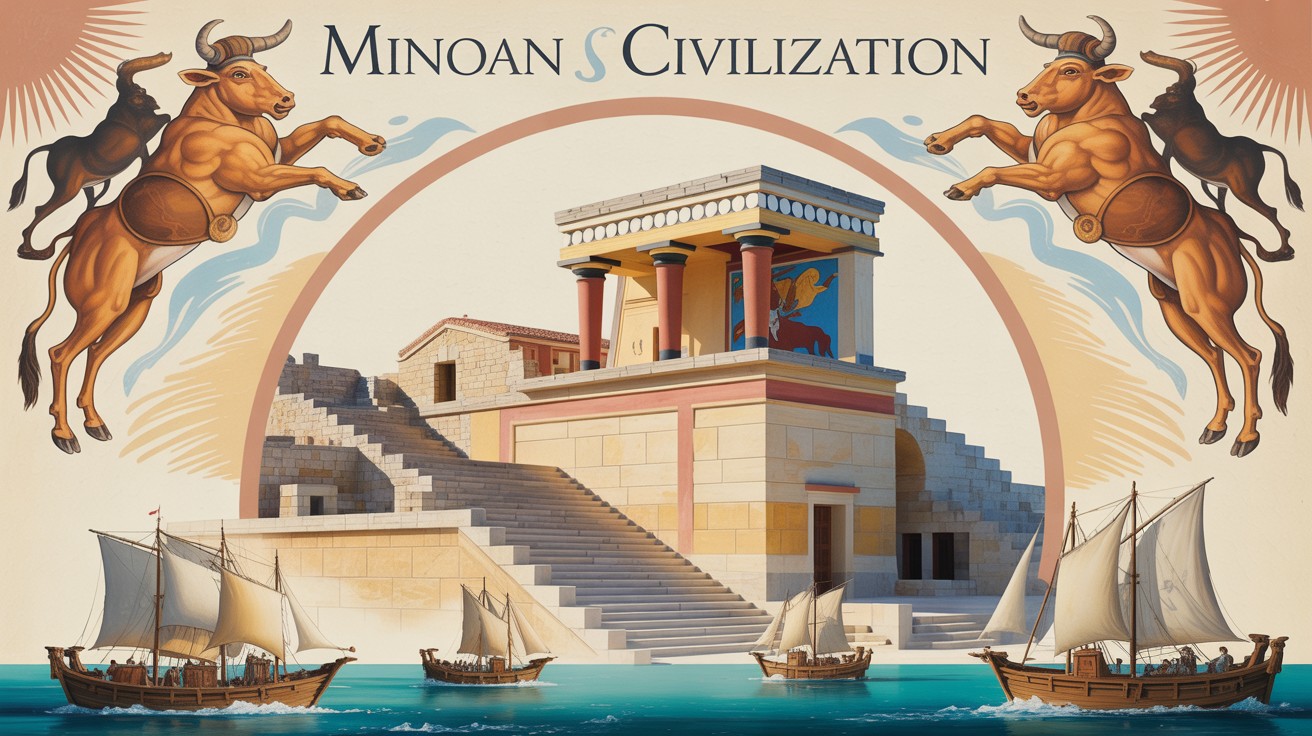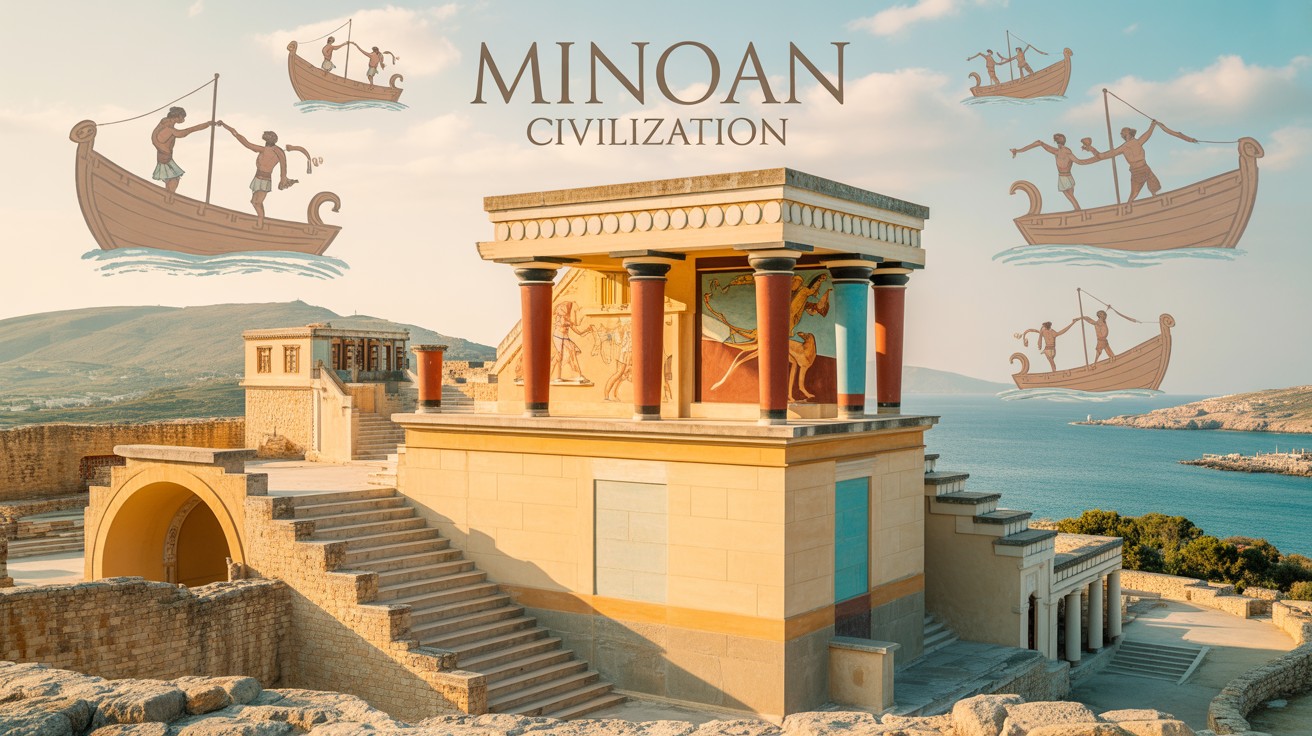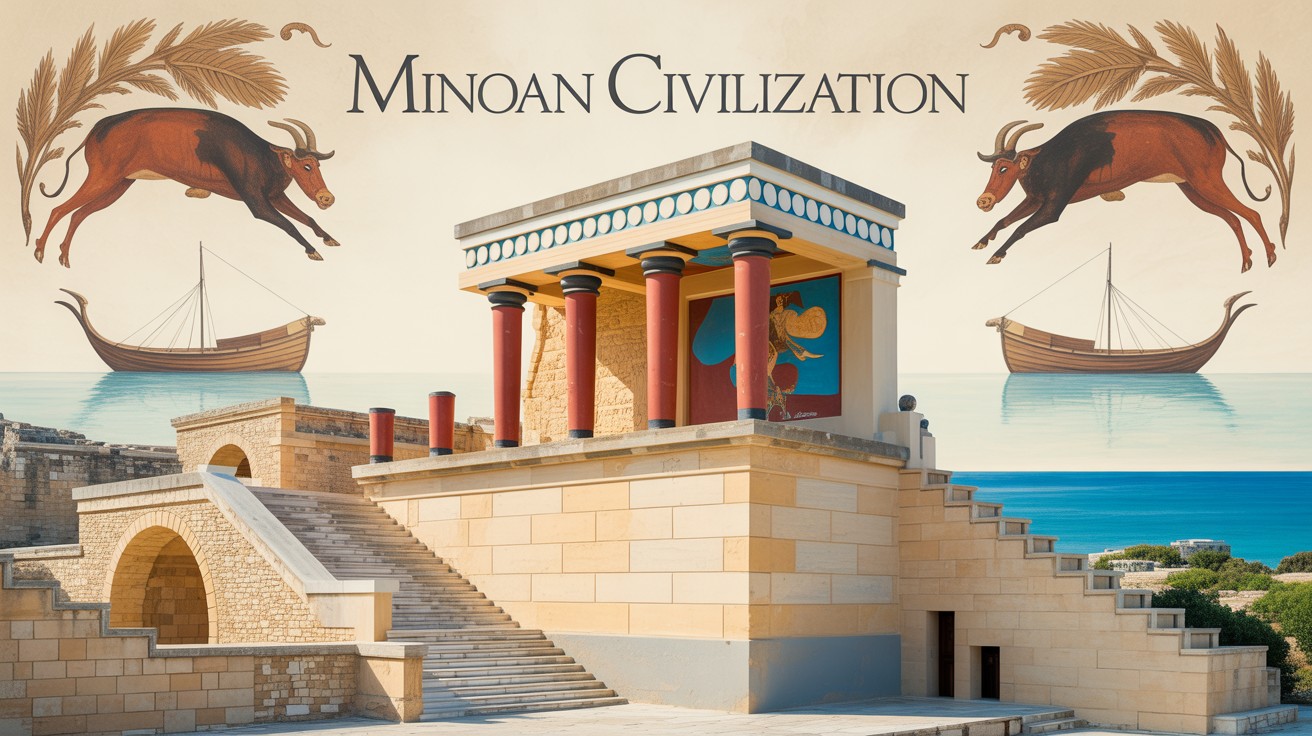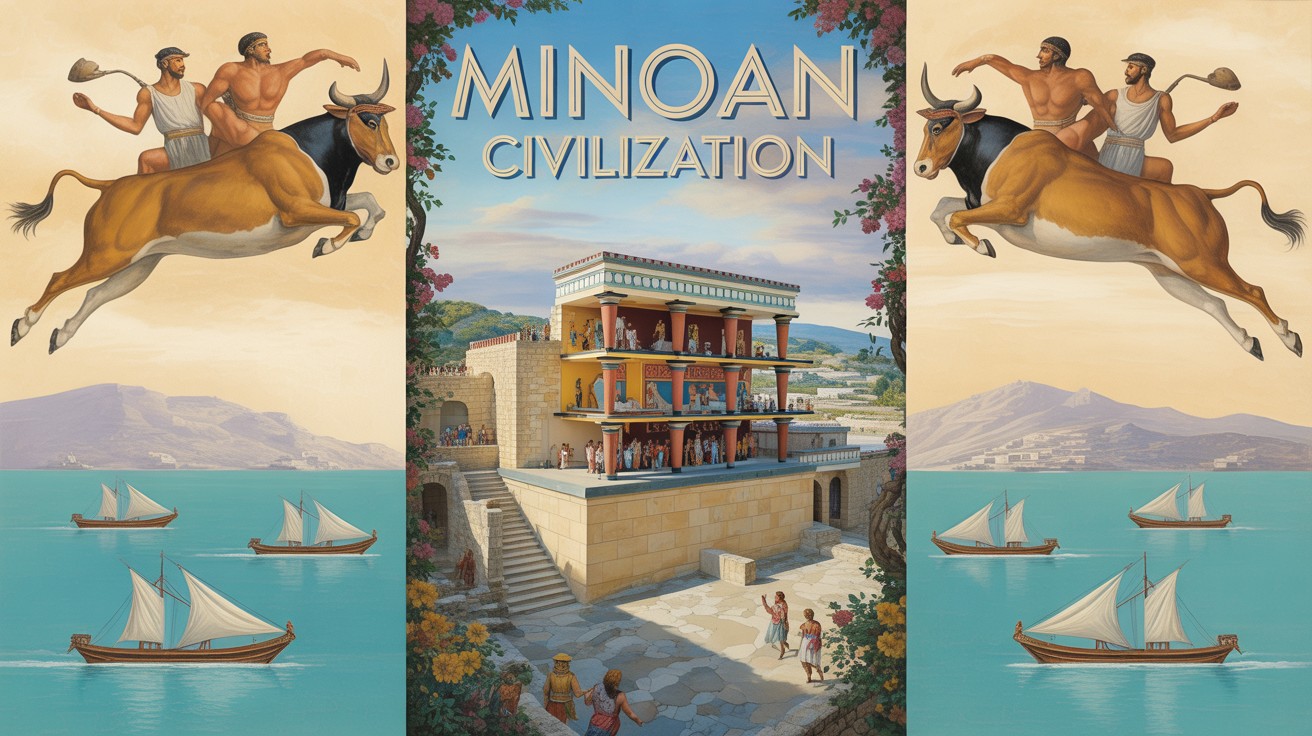Classical Mediterranean Civilizations
Journey through the ancient Mediterranean world, from the artistic Minoans to the mighty Roman Empire. Discover the civilizations that shaped Western culture and continue to influence our world today.
Cradle of Ideas 🌊
Enter a visual journey through the Mediterranean world — marble temples of Greece rising against azure seas, Roman coliseums alive with energy, ships navigating the bustling harbors of Phoenicia, and mosaics unfolding into Renaissance courtyards, all merging toward a modern coastal skyline. The imagery flows in brilliant marble whites, sea blues, and warm terracotta tones, symbolizing knowledge, trade, and cultural exchange across centuries.
The Mediterranean has long been a crossroads of civilisation, where continents meet and cultures intertwine. From the mythic shores of Crete to the bustling markets of Carthage, its waters carried merchants, explorers, and philosophers, spreading ideas as easily as goods. This shared sea nurtured dialogue and diversity, laying the foundation of global culture.
Religion and mythology flourished along its coasts, shaping identities and guiding societies. The gods of Olympus, the mysteries of Egypt, and the sacred rites of Phoenicia all found expression in temples, rituals, and epic tales. These stories bridged human experience with the divine, offering meaning to life’s struggles while inspiring art and architecture that still endure.
Knowledge and philosophy blossomed under the Mediterranean sun. Greek thinkers like Plato and Aristotle questioned existence and reason, while Roman engineers designed aqueducts and roads that bound an empire together. In later centuries, Islamic scholars preserved and expanded upon ancient texts, fueling the Renaissance and sparking scientific revolutions that reshaped the world.
Commerce was the heartbeat of the region, with ships carrying olive oil, wine, textiles, and glass across sparkling waters. Harbors became cultural melting pots, where languages mingled and artistic styles merged. The Mediterranean spirit of exchange not only sustained economies but also enriched traditions, blending influences into new forms of cuisine, music, and design.
Community life thrived in public spaces — agoras, forums, and piazzas — where citizens debated, celebrated, and honored their heritage. Festivals filled with music, theatre, and feasting reaffirmed shared values and identities. This collective energy gave rise to democratic ideals, civic pride, and a sense of belonging that resonated far beyond city walls.
Today, the Mediterranean remains both ancient and modern. Sunlit ruins stand alongside cosmopolitan skylines, while coastal villages preserve timeless rhythms of fishing, farming, and craft. Its legacy lives in languages, cuisine, and art that continue to inspire global culture, reminding us that the Mediterranean has always been more than a sea — it is a living bridge of history, creativity, and human connection.
If you could debate with one ancient philosopher, who would it be?
Classical Mediterranean Civilizations
Explore the seven great civilizations that defined the ancient Mediterranean world and laid the foundations for Western civilization.
Minoans
An advanced Aegean culture from Crete known for art, trade, and peaceful cities. The Minoans created one of the most sophisticated and peaceful civilizations of the ancient world, with advanced architecture, art, and maritime trade networks.

Mycenaeans
Early Greeks who inspired Homeric tales and built massive stone citadels. The Mycenaeans were warrior-kings who created the first Greek civilization, inspiring the epic tales of Homer and establishing the foundations of Greek culture.

Ancient Greece
City-states of democracy, philosophy, and arts that shaped Western civilization. Ancient Greece gave birth to democracy, philosophy, theater, and the Olympic Games, creating a cultural legacy that continues to influence the modern world.

Hellenistic Civilization
A fusion of Greek, Persian, and Eastern cultures spreading from Egypt to India. The Hellenistic period created a cosmopolitan world where Greek culture blended with local traditions, producing remarkable achievements in science, art, and philosophy.

Roman Republic
A system of checks, balances, and conquest before Rome's imperial rise. The Roman Republic established the foundations of representative government and created one of the most powerful military and administrative systems in history.

Roman Empire
One of the greatest empires, famed for engineering, law, and longevity. The Roman Empire unified the Mediterranean world and created lasting achievements in architecture, law, and administration that continue to influence modern society.

Etruscans
A pre-Roman people whose art and urban planning influenced Roman civilization. The Etruscans were sophisticated traders and artists who significantly influenced early Roman culture, particularly in religion, art, and urban planning.

Periods of Mediterranean History
A comprehensive journey through the evolution of Classical Mediterranean civilizations, from ancient foundations to imperial greatness.
2700-1450 BCE: Minoan Civilization
The Minoans created one of the most sophisticated and peaceful civilizations of the ancient world, centered on the island of Crete. They were master seafarers and traders, establishing extensive maritime networks across the Mediterranean. The Minoans built magnificent palaces with advanced plumbing systems, created beautiful fresco art, and developed the Linear A writing system. Their society was remarkably egalitarian, with women playing prominent roles in religious and social life.




1600-1100 BCE: Mycenaean Civilization
The Mycenaeans were early Greeks who inspired the Homeric tales and built massive stone citadels. They were warrior-kings who created the first Greek civilization, establishing the foundations of Greek culture and mythology. The Mycenaeans developed the Linear B writing system, built impressive palaces with cyclopean walls, and created magnificent gold treasures. Their society was organized around powerful kings who controlled vast territories and maintained extensive trade networks across the Mediterranean.





800-146 BCE: Ancient Greece
Ancient Greece gave birth to democracy, philosophy, theater, and the Olympic Games. The Greeks created some of the most beautiful architecture in history, including the Parthenon, and developed advanced mathematics, science, and medicine. Greek philosophers like Socrates, Plato, and Aristotle laid the foundations of Western thought, while Greek art and literature continue to influence culture today. The city-states of Athens, Sparta, and others created unique political systems and cultural achievements.




323-31 BCE: Hellenistic Civilization
The Hellenistic period was a fusion of Greek, Persian, and Eastern cultures that spread from Egypt to India following Alexander the Great's conquests. This era saw the creation of magnificent cities like Alexandria, the development of advanced science and philosophy, and the flourishing of arts and literature. Hellenistic culture combined Greek intellectual traditions with Eastern influences, creating a cosmopolitan civilization that influenced the Roman Empire and beyond. The period produced great scholars like Archimedes, Euclid, and the philosophers of the Stoic and Epicurean schools.



27 BCE-476 CE: Roman Empire
The Roman Empire became the greatest empire of antiquity, stretching from Britain to Egypt and from Spain to Mesopotamia. The Romans were master engineers, building roads, aqueducts, and monumental architecture that still stands today. They developed a sophisticated legal system, created a unified currency, and established the Pax Romana - a period of relative peace and prosperity. Roman culture, language, and law became the foundation of Western civilization, influencing art, architecture, government, and language for centuries.




509-27 BCE: Roman Republic
The Roman Republic was a system of checks, balances, and conquest that preceded Rome's imperial rise. It established the foundations of representative government with its Senate, consuls, and popular assemblies. The Republic expanded through military conquest, creating a vast network of provinces and client states. Roman law, engineering, and administrative systems developed during this period, along with the concept of citizenship and civic duty. The Republic's military prowess and political innovations influenced democratic systems for centuries.





800-100 BCE: Etruscan Civilization
The Etruscans were a pre-Roman people whose art and urban planning influenced Roman civilization. They created sophisticated cities with advanced drainage systems, developed a unique writing system, and produced magnificent bronze and terracotta art. The Etruscans were skilled metalworkers, creating intricate jewelry and bronze sculptures. Their religious practices, including divination and elaborate funeral rites, influenced Roman religion. The Etruscans also contributed to Roman engineering, architecture, and military tactics, particularly in the development of the arch and the organization of armies.



Mediterranean History Timeline
The evolution of classical Mediterranean civilizations
Mediterranean Legacy
The foundations of Western civilization
Power of Mediterranean Culture
Transform Ancient Wonders into Modern Masterpieces
Instant Video Creation
Transform Mediterranean artifacts into stunning videos instantly! From Greek temples to Roman amphitheaters, create cinematic masterpieces in seconds. Our AI brings ancient Mediterranean to life with motion graphics, transitions, and atmospheric effects.
Digital Archives
Access the world's largest collection of Mediterranean cultural assets! From high-resolution temple photography to detailed artifact imagery, build your personal archive of ancient wonders. Download, organize, and use thousands of authentic Mediterranean images.
Cultural Remixes
Remix Mediterranean art like never before! Combine classical columns with modern design, merge Greek mythology with contemporary styles, or create surreal mashups of ancient temples with futuristic elements. Your creativity is the only limit!
Ready to Create Mediterranean Magic?
Join thousands of creators who are already transforming ancient Mediterranean into modern masterpieces!
Explore Mediterranean Visuals
Discover thousands of high-quality images from classical Mediterranean civilizations and transform them with AI effects.
Start Exploring